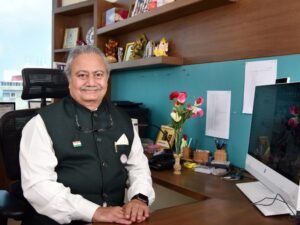No products in the cart.
MAHE: Revolutionising healthcare through world-class Health Sciences education
– Dr. Sharath K. Rao, MBBS, MS Ortho, FRCP (London), pro-vice chancellor Health Sciences, MAHE
At Manipal Academy of Higher Education (MAHE), we have always believed in equipping students with an education in Health Sciences to provide healthcare that is comprehensive and future ready. Our academic and research ecosystem is enriched through 250+ global collaborations. These partnerships make it possible for our students to participate in co-tutelled PhD programmes, leading to dual degrees that enhance global employment opportunities and research exposure. Semester-abroad programs with seamless credit transfers that allow them to access diverse pedagogies and healthcare systems firsthand.
Our faculty, over 2000 of them, are actively involved in international research collaborations, which ensures that the most current global health trends reflect in our curriculum. We integrate skilling, upskilling, and reskilling modules across all levels of health science education, benefiting more than 15,000 students and staff each year. By prioritising dual degree pathways, transnational research supervision, and continuous competency development, we’ve built a robust structure that puts us ahead of many institutions in India.
Our Health Sciences research ecosystem spans across 29 multidisciplinary institutes. We have a strong and growing research output, with over 2800 high-impact publications annually. As of 2024, we have filed 180+ patents and have had 21 patents granted. Some of our recent work includes the identification of a new EPB41L3 gene-linked disorder, published in Brain, and a collaboration on an EU-funded, six-country consortium using AI for cervical cancer screening.
We also developed India’s first Laser Shoe Technology for treating diabetic neuropathic pain, funded by the Department of Science and Technology. At the Manipal Institute of Applied Physics, we’ve created patented biosensing platforms and optical printing technologies for non-invasive diagnostics. Our teams at Kasturba Medical College (KMC) have contributed to global studies on sperm health post-COVID vaccination and Bartonella quintana endocarditis.
We maintain a collaborative environment across the wide range of institutions under our umbrella, including three medical colleges, two dental colleges, and schools of pharmacy, nursing, allied health, AYUSH, life sciences, public health, and regenerative medicine.
Interdisciplinarity is not a buzzword for us; it is part of our everyday learning. We promote it through initiatives like Interdisciplinary Research Conclaves, Collaborative Health Research Expos, Integrated Learning Programs, and Global Exchange Programs. These initiatives help us enhance patient care, academic rigour, and create intensive research domains of study.
One initiative I’m especially proud of is the Wilderness Medicine and Conservation Research Centre, inaugurated on 08th July 2024 at Kanchinabailu, Manipal. It reflects our commitment to innovation in Health Sciences by combining healthcare with environmental conservation. Constructed using locally sourced and recycled materials, the Centre provides hands-on training in search and rescue operations, simulating wilderness emergencies, planting native trees, and designing expedition medical kits. Through collaborations with the Department of Emergency Medicine and the Department of Emergency Medicine Technology, students gain practical skills in both clinical and technological aspects of wilderness medicine. The curriculum is aligned with international Sustainable Development Goals (SDGs), and prepares students for meaningful careers in wilderness medicine, conservation healthcare, and global eco-health sectors.
MAHE prepares its students to engage with global health challenges in a qualified and globally integrated manner. Our partnerships facilitate joint research, dual degree programs, and exchange opportunities with direct exposure to international healthcare systems. We’ve incorporated the UN’s SDGs into our curriculum, offering practical and field-based training in maternal and child health, mental health, and public health preparedness. Our research impact has grown steadily. Our Field-Weighted Citation Impact (FWCI) rose from 0.53 in 2020 to 1.71 in 2024, meaning our work is now cited 50% above the global average. Students here are contributing to innovative projects in AI-based diagnostics, telemedicine, and personalized biosensing wearables. With support from ICMR, DST, and DBT, we continue to grow our leadership in translational and globally relevant healthcare education.
Looking ahead, MAHE continues to lead in merging technology with healthcare education. In Health Sciences, we take a technologically forward approach to training by integrating virtual reality, augmented reality, virtual dissection tables, and simulation-based surgical training into our curriculum. These tools create a risk-free and immersive learning environment that helps students develop critical thinking and decision-making skills for real-world medical scenarios.
Our vision for the next decade is clear: to achieve global leadership in Health Sciences and reach a top 50 global ranking and a top 10 NIRF ranking across our disciplines. We’ve already taken steps to advance research in regenerative medicine, biotherapeutics, and integrative healthcare. On the academic front, we continue to invest in infrastructure from our simulation labs and anatomy museum to Asia’s largest Health Science library.
Also read: MAHE: Where Indian Minds Meet Global Opportunities
















Add comment